Bringing business logic and important operations to life at once, the backend is undoubtedly the most vital part of our applications. So, choosing a tool that would make the backend highly effective and scalable is critical. Luckily, there is a wide array of advanced programming languages to choose from for the task. Still, the list is long and the languages differ in many aspects, making the process of choosing the right one for your particular case quite daunting.
To help you make the right choice, we will focus on two most promising backend technologies — NodeJS vs Golang. Both can be considered as evolving languages, but both became popular in different projects.
In this article, we will help you choose the best language for your project with the Node.js vs Golang comparison.
Let’s start.
What is NodeJS?
NodeJs is an open-source, server-side runtime environment built on Google Chrome’s V8 JavaScript engine. Since its introduction in 2009, NodeJS has become the most popular environment to build cross-platform applications. It features an event-driven, non-blocking (asynchronous) I/O model designed to develop highly scalable server-side applications using JavaScript.
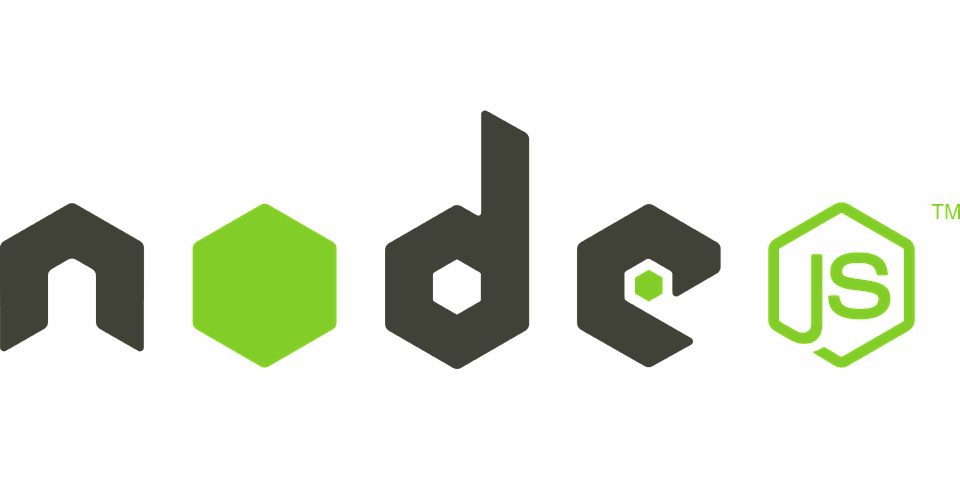
NodeJS is written in JavaScript. So, it makes it easier for developers to write both client-side and server-side scripts using a single language. Supported by Windows, Mac, Linux, and Unix, NodeJS is stocked with plenty of open-source JS libraries that simplify the procedure of web application development.
What is Golang?
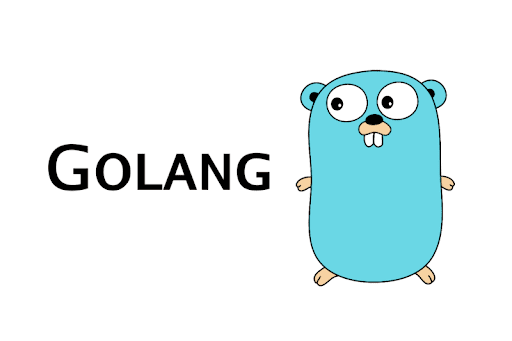
Golang, commonly known as Go, is an open-source, statically-typed, multi-purpose programming language created by Google in 2007. It holds a combination of performance and security benefits of C/C++ and speed of Python. Go is a structural, strong, and effective way of handling concurrent programming and preferred for its good garbage collection handling, memory safety, and dynamic interfaces.
Not strongly recommended for web development, Go works best for cloud-based interfaces, networking applications, real-time application development, and microservices.
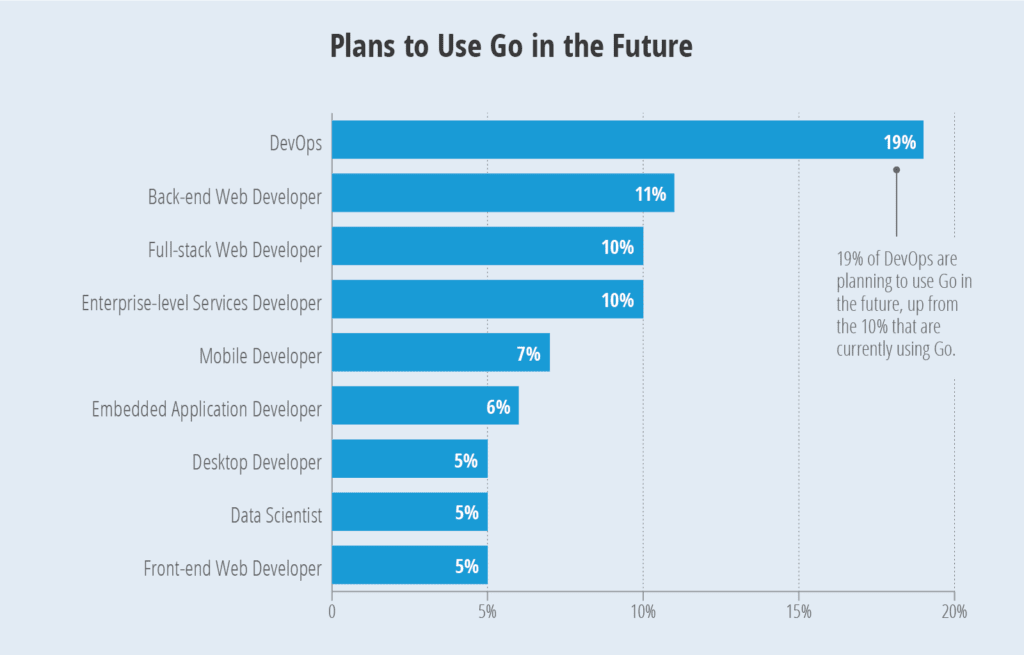
Go vs Node Battle
Now that we have explored the basics of both languages, let’s dive into the Go vs Node JS comparison by discussing their pros and cons, so you could which fits your project best.
Go vs Node JS: Performance Factors
There are different factors that influence the performance of a programming language. One should carefully pick a programming language with which a program can be developed efficiently. Here are the factors you should consider while choosing Go vs Node.

Go vs Node JS: Maturity
Though Go was introduced in 2009, it can be considered a mature and robust tool. At the same time, Node JS shows the same level of maturity and has the support of a broader audience.
So, both stand almost equal in the Node vs Golang maturity comparison.
Go vs Node JS: Raw Performance
Google decided to introduce Go due to its frustrations with existing programming languages. When compared to Node JS, Golang is a better option for raw performance and computation. It is a fast, lightweight platform as it is based on characteristics of C and C++.
On the other hand, statically-typed Node JS is a derivative of JavaScript and hence, it is generally slower than other programming languages. Unlike Golang, Node JS is unable to offer the raw performance of CPU or memory-bound tasks. Simply put, Node JS can perform equally high or horrible, depending on the nature of your app.
In the Go vs Node JS performance comparison, Go surpasses NodeJS and helps developers achieve better performance.
Go vs Node JS: Real Life Performance
When comparing Go vs Node.JS real-life performance both languages are able to offer almost the same results. For instance, when it comes to database connection or network communication, Golang and Node JS perform equally, and at equal speed.
Go vs Node JS: Error Handling
Error handling in Go demands you to implement explicit error checking. The compile-time and run-time errors are handled differently which raises problems for the developers. However, the creators of Golang have started working on additional error handling functionality that can help shorten development time.
On the other hand, Node JS implements the traditional throw-catch error handling mechanism which is quite popular among programmers. With this conventional approach, the errors are displayed and corrected immediately before performing any further operation.
When comparing the error handling mechanism of Golang vs Node, a lot of web developers find Node JS better as they are quite familiar with the throw-catch approach.
Go vs Node JS: Learning Curve
Go is a complete and relatively new language with specific concepts, processes, rules, interfaces, and pointers. It has fewer resources available online so, developers have to carry out intensive research to get a decent grasp on it.
JavaScript, on the other hand, is the most commonly used programming language across the world. Therefore, it is easy for developers to learn Node JS even if they have basic knowledge about JavaScript. As JavaScript is a veteran, many online and offline resources are available to help newbies, and there is also a huge JS community that shares expertise and offers assistance.
Thus, in the Go vs Node.JS learning curve comparison, the latter wins.
Go vs Node JS: Concurrency
Concurrency is a strong side of Go as it is best suited for large software projects which require thousands of requests to be handled simultaneously. Go uses coroutines (called Goroutines) and a lightweight thread communication mechanism which allows developers to run their functions concurrently. While users can run their functions simultaneously using Go, this is sadly not the case with Node JS.
Node JS is single-threaded and makes use of event-callback mechanism, hence, everything has to be done in a linear order and concurrency cannot be achieved.
So, in this round of Go vs NodeJS, Go is the champion!
Go vs Node JS: Scalability
Go wins the Go vs Node scalability battle by landslide as well. Goroutines are a major asset of Go, helping in handling parallel threads effectively and reliably. On the other hand, Node JS’s scalability is less functional. Thus, t is not recommended for large projects due to its weaker parallel process.
Go vs Node JS: Development Tools
Go is a new language, it has not become very popular yet. It comes with decent libraries and packages, but there are fewer tools are available compared to NodeJS. Those who are planning to master Go need to do thorough research and have experience in manual configuration.
When it comes to NodeJS, it has a wide array of tools, frameworks, and libraries available for developers to build all sorts of applications. Moreover, JS has a huge community that provides extended support for all kinds of development tasks.
Therefore, Go loses the Node vs Go battle when it comes to development tools.
Go vs Node JS: Availability of Developers
As Go is a new language, finding Go developers can be difficult. However, the language is among the most promising and has a bright future ahead of it.
NodeJS is a popular programming language and undisputedly popular among the developers. It is much easier to find developers with Node.js expertise and form a team of professionals for different development tasks.
Hence, Node JS leaves Go far behind in the race of Node.js vs Go.
Golang vs Node: What makes them powerful?
Also called one of the most popular programming languages of today, Go secures top positions worldwide as it enables top-of-the-line productivity and use of multi-core power, while Node stands out among other backend development technologies as it comes with a complete environment equipped with all necessary development tools.
Node.js vs Go: Which companies are using them?
With everything moving faster than ever before, companies adopt new technologies to achieve faster performance and better quality in their software development process. Now, let’s discover which of the languages top companies have chosen for backend development after accessing a Node.js vs Go comparison:
Node.js
- Netflix
- Trello
- PayPal
- Medium
- eBay
- NASA
- Walmart
Go
- BBC
- Uber
- Medium
- Basecamp
- Intel
- Docker
- Heroku
With the launch of Go, many companies decided to migrate from their current technologies, including NodeJS, to Go so as to improve the performance of their software. This the point where the Node JS vs Go battle began.
Like many others, Uber switched from NodeJS to Go in 2016 to achieve better software performance results, and shared its experience after: the company achieved 99.9% uptime with Go.
Node Js vs Golang Benchmark
Go is a new and well-designed statically-typed programming language. From the performance aspect, Go performs very well and beats NodeJS to a certain extent. Below is an example that shows the benchmark task performance of Node JS vs Go for different computer language methods and algorithms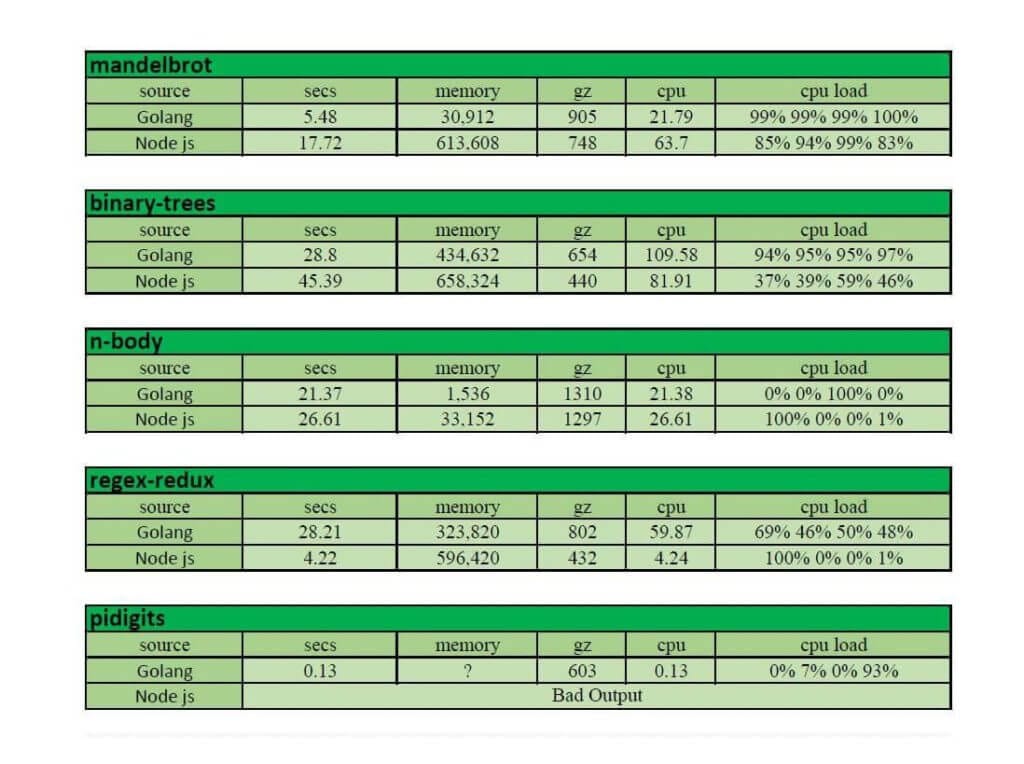
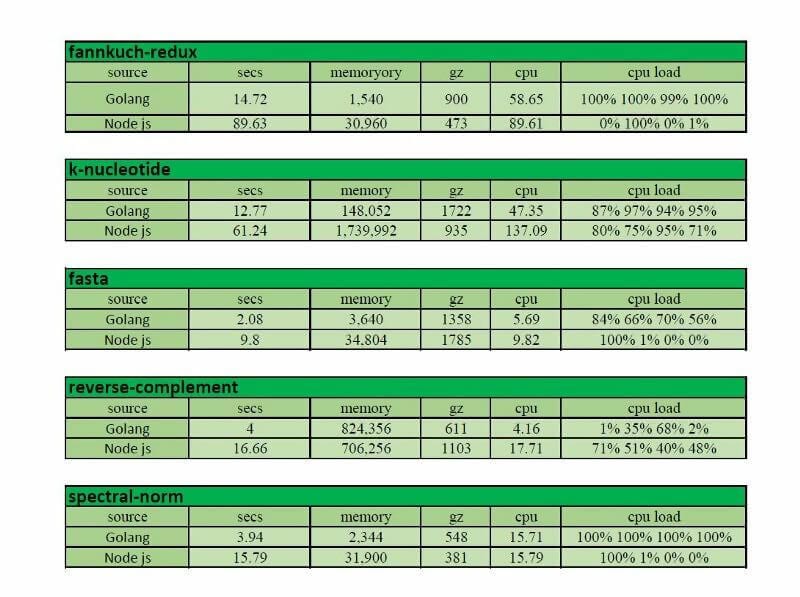
It is observed that Golang takes less time, memory, and CPU load to perform operations as compared to NodeJS.
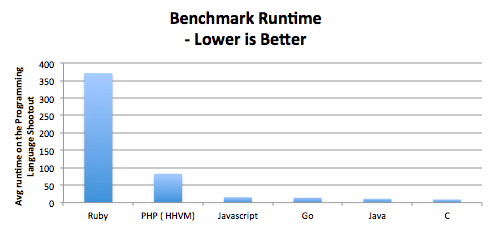
The lower the mark, the better, so Golang wins the test of NodeJS vs Golang benchmark task.
NodeJS vs Golang – Which is the best?
Having made a thorough Node JS vs Golang comparison, it is overwhelming to declare one as a winner, as both have their strengths and weaknesses. From the performance perspective, Golang definitely wins, while Node.JS excels in simplicity, development tools, and richness of front-end development tools. However, when it comes to NodeJS vs Golang, your choice will depend solely on the project in question.
Want to know more about the topic and find out how your business can benefit from the latest technologies then talk to our experts to get the most relevant information regarding this matter.